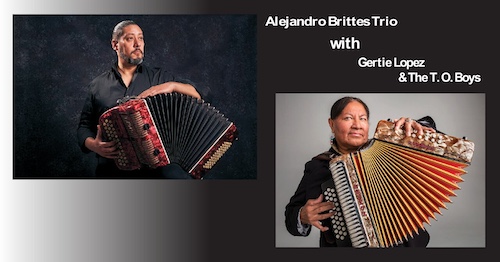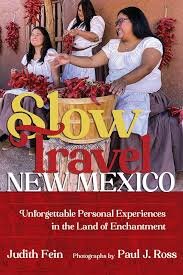 Accordionists Alejandro Brittes Trio with Gertie Lopez and the TO Boyz
Accordionists Alejandro Brittes Trio with Gertie Lopez and the TO Boyz
Thursday, September 19
7pm
Light Hall Theater
$20
www.wnmu.edu/culture
Brazil-based Argentine composer, accordionist, and researcher Alejandro Brittes explores the music and dance tradition of northeastern Argentina, chamamé, which has been declared as Intangible Cultural Heritage of Humanity by UNESCO.
Alejandro navigates with his accordion, playing with the temporal universe of his music. He utilizes gravity to awaken the sensation that the music can touch your skin. A unique perception that the music fluctuates, and in listening to it, you enter into a space in which anything can happen around you without you even perceiving it.
Alejandro´s concerts establish a connection with the earth, with the origins of the music of his home region and with the universe. His trademark is to employ his accordion as if it were a bandoneón, in conversation between the left and right hands. The basses of the left hand are masterfully explored, because according to Alejandro, the low basses connect us with the earth, and the right hand button keyboard, beyond providing melody to the music, elevates us to the Universe.
His musicality and his compositions express an uncommonly diverse musical intellect.
The ancestral based rhythm connects the listener with the earth and the universe through music. Connecting musicality and cosmovision (The cosmic worldview of a society or civilization), of the Indigenous Guarani and Baroque music within the context of Jesuit missions in a cultural microregion of Argentina, central and southern Brazil, Paraguay and Uruguay, that extend through watersheds and fresh water sources in these nations.
Gertie Lopez is a celebrated Tohono O'odham accordionist, celebrated in the Tucson area for decades. She is revered as the only female band leader on the Tohono O'odham reservation.
Distinguished Speaker Series
Judith Fein and Paul Ross
Tuesday, September 24
7pm
Light Hall Theater
Free
Authors of Slow Travel New Mexico: Unforgettable Personal Experiences in the Land of Enchantment. Award-winning travel journalist Judith Fein and photographer Paul J. Ross crisscross New Mexico, finding unforgettable adventures readers can personally experience such as painting with an abstract artist on the Navajo Reservation, visiting a wolf refuge, cruising in a lowrider or tracking the real-life Billy the Kid. Fein and Ross will share their insights and New Mexico travel tips.
 "It's all there, right within reach, if you learn how to go off the beaten mental path," says award-winning international travel journalist Judith Fein. "Travel has become a commodity written about in charticles and listicles, a consumerist activity vetted by others who spent and went before you. Slow travel is a whole other way to go. And even if you can't travel, it's a way to open doors and have adventures happen in your daily life."
"It's all there, right within reach, if you learn how to go off the beaten mental path," says award-winning international travel journalist Judith Fein. "Travel has become a commodity written about in charticles and listicles, a consumerist activity vetted by others who spent and went before you. Slow travel is a whole other way to go. And even if you can't travel, it's a way to open doors and have adventures happen in your daily life."
For two years, during the pandemic, Fein and her photojournalist husband Paul Ross, replaced international travel with a deep dive into the magic of their home state of New Mexico. They were on the qui vive, looking for unusual experiences and people that were good for mind, body, and soul.
Their new book, Slow Travel New Mexico: Unforgettable Personal Experiences in the Land of Enchantment, has been a bestseller on Amazon since its publication by UNM Press a few months ago. It invites the reader to learn what slow travel is, gives tips on how to make every day of your life an experience, and provides information about how you can have each of these adventures yourself.
The event will include a talk by Judith, cowboy poetry by Paul Ross (aka PJ), and a book sale and personalized signing.
Sidy Samb and Afroflamenco
Thursday September 26
7pm
The Gardens at Light Hall
Free
Sidy Samb is an acclaimed Senegalese musician who has made his home in Spain for decades. A founding member of the celebrated flamenco-fusion hitmakers Mártires del Compás, Samb's latest solo project is a manifestation of his unique Afroflamenco sound, re-connecting flamenco to its African roots while exploring the subtle connections and unique divergences between the iconic sounds of his two homelands. Afroflamenco draws on griot tradition and Roma virtuosity to create a music-fueled, cross-cultural encounter. With lyrics sung in Wolof, Lingala, Bambara, Pulaar, French, English and Spanish, and is a simmering polyglot of languages, rhythms and ideas, brimming over with passionate performances at the intersection of African and Iberian traditions.










